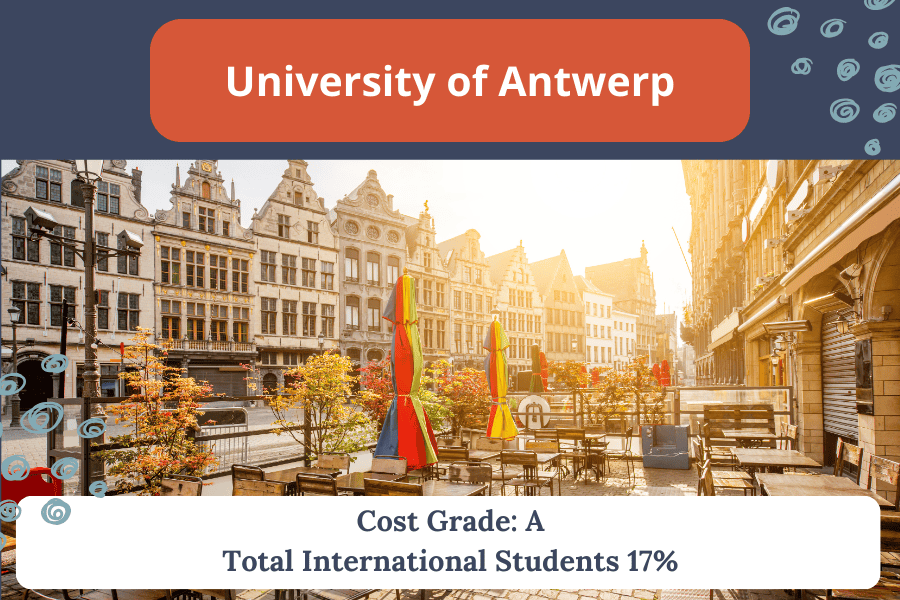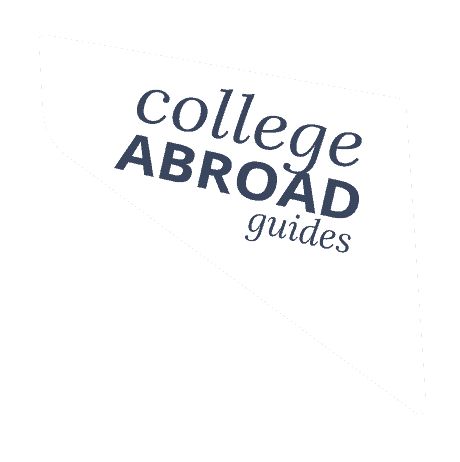The Best 9 Sole English-Taught Programs at Non-US Universities

- Originally published
- Last updated on September 9th, 2024 at 09:43 am
Table of Contents
Here at College Abroad Guides, our ranking system gives extra weight to countries where you can find multiple courses of study and local resources in English.
So, when some universities teaching just a sole major in English make the cut, we think they’re pretty special.
If you’re looking to spend a few years in a small course, excited to immerse yourself in a unique culture you can’t get anywhere else (but you may not be able to talk to anyone else on campus), try these unique one-hit wonders:
1. University of Antwerp, Social Economic Sciences

It started out as a popular multidisciplinary degree for internationals, so the University of Antwerp decided to up the game and offer the course in English. The program debuted in 2021-2022.
Want to join one of the first cohorts? You’ll break down everything from stats to business from the lens of both economics and sociology. The course has switched out a few offerings that focus on Belgium to make the degree dynamic for internationals.
There’s quite a bit of flexibility in modules, so students get to create their own path. While you might focus on “social policy” one year, you’ll still control how and what you study. At the beginning of your study, classes are large, which just means more English-speaking friends.
2. The University of Tokyo, Global Science

Kyoto’s rival also brings one STEM degree in English to the international stage.
It’s known as more traditional, business-minded, and lecture-based than “study if you want” Kyoto. There are two programs here: an “International Program on Japan in East Asia” and an “International Program on Environmental Sciences.” First, take 2 years of general coursework, then specialize in one or the other.
Kyoto has a reputation of being the more “international” of the two. However, here on the leafy suburban Tokyo campus, you’ll find a diverse group of students from all walks of Japanese life. You’ll also find an A+ education from a unique perspective.
3. KTH Royal Institute of Technology, Information and Communication Technology

Fun fact: it stands for Kungliga Tekniska Högskolan.
Another fun fact: It’s ranked in the top 25 in the world for engineering, and is Sweden‘s de facto MIT, producing a third of the country’s research. The university has an extensive center focused on language within the context of STEM subjects, including learning Swedish. It focuses on global competencies that help local students access resources across Europe. It also encourages work that crosses borders.
On the Kista campus, you’re a 15-minute bus ride from downtown Stockholm in an area dominated by low-rise industry partners, so you can work more closely with players in the field.
You’ll also get lots of elective choices to tailor how you study digital communication, so your lectures and labs reflect how you’ll bring your education to the communications industry of the future.
There’s a huge sustainability component to the program, too, so if green energy and global sustainability goals in systems are part of your dream career, you’ll be able to work on important issues relating to the environment and tech here.
4. University of Iceland, Icelandic as a Second Language

Though it’s got a more American presence at the master’s level, you’ll find language programs in English at the undergraduate level custom-built for internationals. Plenty of Americans attend. Iceland-o-philes will find they can learn the language and culture with a cohort of other foreigners right from the beginning of their undergraduate careers.
This foundation could set you up for graduate studies in Icelandic (Arctic studies, medieval Icelandic studies, Viking and medieval Norse studies, Nordic studies, small state studies, historical archaeology, international environmental law, tourism, and renewable energy have a particular appeal for study while immersed in Icelandic culture and geography).
In the meantime, Reykjavik is an ideal place for students looking for a peaceful, clean country that splits the difference between US and Euro cultures. Straddling the literal tectonic plate divide between North America and Europe, Iceland also straddles its lifestyles. It’s car-dependent, with shopping malls, schools, and parking lots often far away from residences. There’s also little public transportation outside of Reykjavik.
However, the country comes with the social and cultural policies of the European mainland. The cost of living is high, but tuition savings can offset the sticker shock.
5. Linköping University, Experimental and Industrial Biomedicine

Project management? Developing new drugs? Chemistry? Combining the lab work of science with entrepreneurial opportunities across tech and medicine?
This program sounds cutting-edge, but at its heart, you’ll dig deep into traditional science fields like chemistry, immunology, physiology, and genetics.
By your second and third years, you’ll add big data, statistics, and clinical trial protocols to your tool kit. The program even comes with a semester of labwork, so you’ll have a project under your belt at graduation.
The town is small, but it’s student-centred, and international student presence abounds. International societies can ease the transition for newcomers since internationals (especially those with limited Swedish) can find it tough to break into the local scene.
6. University of Pardubice, Informatics in Public Administration

While there’s a single undergraduate English-taught degree at Czechia’s University of Pardubice, there’s an international office set up to guide students through the process of applying, getting a visa, and finding housing. That’s a load off for students who can’t conduct their business in Czech (and employees speak English, as well as French). There’s also an easy transition to a master’s or Ph.D. in the same field if you’re eager to stay.
The program includes some surprises, like economics and Czech law (as well as gym, so be prepared to sweat!).
Pardubice is a college town: it has about 90,000 people and is chock-full of restaurants from all over the world. Heck, even the street signs have English translations. You’re across the river from a charming old town full of cobblestones that’s surprisingly connected to the rest of Europe — Pardubice is a direct, hour-long train ride from Prague (it’ll cost you less than $5). There’s also a direct flight to London every day.
7. Swedish University of Agricultural Sciences, Forest and Landscape

Welcome to one of the world’s most elite forestry programs among a smorgasbord of top ecological science programs (environment, agricultural sciences, plant and animal science, and water resources are all ranked in the global top 100 according to US News).
Take classes like “trees,” “urban tree and forest health,” and “business management in forest and landscape.” Practical, hands-on summer courses can take you to central Sweden to observe forestry practices up close, from reindeer grazing to operations planning.
There’s high English competency in Sweden, which makes being the sole bachelor’s cohort taught in English a little less lonely. There are also multiple campus hangouts, events, and activities that help you mix with other English-speakers. The southern Alnarp campus is 30 minutes by bus to Malmo, Sweden, just across the bridge from Copenhagen. That’s pretty connected. Want to get even more international? You can also spend part of your studies at a partner university in the Netherlands.
8. University of Pisa, Management for Business and Economics

This small cohort of international students (among a highly international faculty) takes advantage of a Tuscan college town and a huge university to stand apart in their knowledge of global business and economics. Pisa is close to the west coast of Italy, within day-trip distance from the rest of Tuscany, like Florence, and even Rome.
As one of the sole 25 English-taught speakers among 50,000 students, management students have a unique vantage point in the small Tuscan tourist town.
However, they’re not completely alone. There are many more master’s degrees taught in English, including economics, so you can apply to continue your education to expand your global outlook even more, or simply find some older friends to hang out with. And moving in isn’t intimidating with a university program that provides access to an international student center helping students with checklists and logistics.
However, you won’t find many students online to discuss this small program. While many Italians in Pisa speak English, Italy remains a sleeper hit: the program doesn’t do much outreach, doesn’t reach many Americans, and engages in English-taught programs for the benefit of ESL business students who want to improve their chances of landing a job in an ever-increasingly English European business climate.
9. University of Helsinki, Science

The University of Helsinki boasts that 90% of its international students would recommend it to a friend.
That’s a big number, and speaks to the university’s ability to provide the resources that newcomers need to survive (and thrive) in an environment where they’re the only English-taught cohort in a university of 31,000 students.
Further, the resources they offer to make sure that students understand them are formidable, like virtual tours and deeply fluent versions of university resources, like web pages, so students aren’t shut off from basic educational and logistical needs. There’s also a newsletter, a student chat app, and an English-language blog from students.
Helsinki is just as forward-thinking and comprehensive in its science program. There’s an entire science campus here with modern facilities in a connected, global capital city. Social issues undergird the program, like “human-centered technology” and “a fair society.” Online open-university courses can prep you for the teaching and learning environment of on-campus courses. Once in the program, you’ll get a grounding across the sciences, from chemistry to biology and physics. Choose a specialty in your second and third year, or combine tracks to stay flexible.
Want to be in a Sole English-Taught Program?
English-taught programs abound in global universities today. But they’re not all open to international students. Many are designed to get locals the English language skills they need to succeed in their careers, with the mobility to move around (especially within the business world of the EU).
Yet some sole English-taught programs are happy to host internationals. They are designed to host a global cohort of learners, and the programs themselves benefit from all kinds of diverse students coming together in small groups to learn as a community.
Many of the programs we’ve featured admit about 25 students per year (as do others in 2- or 3-program universities). That means you’ll have a friend group from day 1. You’ll have a more structured program journey with few electives. You’ll have a more nurturing faculty and administration, often charged with herding freshmen into the country and through the hurdles of finding housing, getting a visa, and handling life tasks, from busses to medical insurance.
There are pros and cons to taking this approach through your undergraduate journey, and only you can decide if that’s right for you.
But make no mistake, if you choose the sole English-taught program in a university full of native-language speakers, you’ll have a unique college experience!
Related Posts

Jessica Share
Jessica is the writer, Ph.D., and mom-of-an-abroad-student-in-the-UK at the helm of College Abroad Guides. When she's not asking college students where the coolest place to hang out in their city is, she's figuring out how she can make $60 imported Greek oregano potato chips and £50 British bacon potato chips appear on her doorstep for the cost of a local bag of Lay's.





